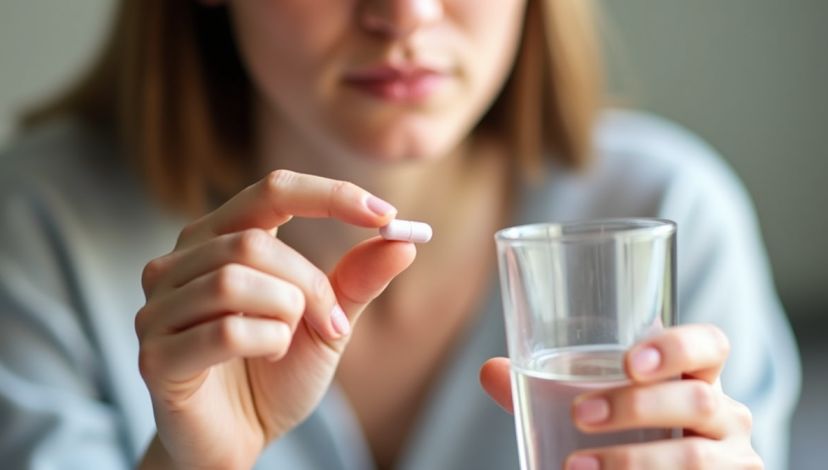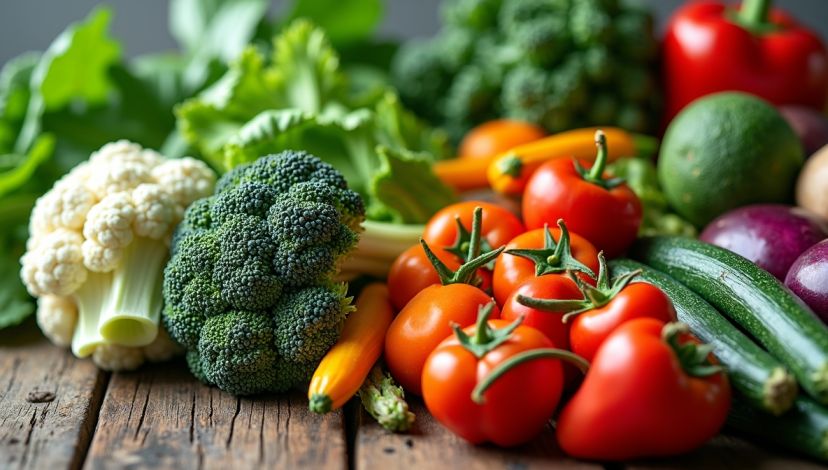Menopause is a life transition that involves significant physiological changes, marking the end of fertility and often accompanied by physical and emotional fluctuations. As a woman’s hormones shift during this phase, her metabolism, bone density, heart health, and weight are affected, with many experiencing hot flashes, mood swings, and fatigue. The best diet for menopausal women supports these changes by helping to ease symptoms and reduce long-term health risks like osteoporosis and cardiovascular disease, making optimal nutrition a key part of overall wellness during this stage.
The right eating patterns can boost energy levels, aid healthy weight management, and enhance quality of life through balanced regulation of hormones and decreased inflammation. By making informed food selections, women navigating menopause can feel empowered to progress through this natural process strong and vital.
Key Points:
- Nutrient-rich eating supports bone and cardiovascular health during menopause.
- Whole foods high in fiber, protein, and good fats can help control symptoms and weight.
- Reducing sugar, salt, and processed foods is key to long-term wellness.
Why Optimal Nutrition Matters in Menopause
Menopause brings innate alterations impacting metabolism and nutrient uptake. Declining estrogen levels influence bone density and increase osteoporosis and heart concerns. Additionally, changes in body composition and a tendency towards abdominal weight gain are common.
An effective diet customized for menopausal women emphasizes:
- Bone strength through calcium and vitamin D
- Heart health via healthy lipids and low sodium
- Blood sugar regulation to curb cravings and mood swings
Expert Insight:
Dietitian Maria Smith noted, “Focusing on whole foods abundant in antioxidants and anti-inflammatory nutrients empowers women in menopause. It helps address symptoms while supporting enduring health.”
Understanding these special needs allows women to adapt their eating habits sustainably and enjoyably while promoting wellness.
Key Nutrients and Foods for Optimal Menopause Nutrition
Choosing optimal foods is pivotal to maximizing health during menopause. Here are seven dietary fundamentals recommended by specialists and backed by science:
| Nutrient/Food Group | Benefits During Menopause | Food Sources |
| Calcium and Vitamin D | Supports bone density and reduces osteoporosis risk | Dairy products, fortified plant milk, leafy greens, salmon, sunlight exposure |
| High-Quality Protein | Maintains muscle mass and supports metabolic health | Lean meats, fish, eggs, legumes, nuts |
| Fiber | Improves digestion and helps control weight | Whole grains, fruits, vegetables, legumes |
| Healthy Fats (Omega-3) | Supports heart health and reduces inflammation | Fatty fish (salmon, mackerel), flaxseeds, chia seeds, walnuts |
| Antioxidants | Reduces oxidative stress and symptoms like hot flashes | Berries, leafy greens, nuts, seeds |
| Low Sodium | Helps control blood pressure | Limit processed foods, use herbs for seasoning instead of salt |
| Phytoestrogens | May help balance hormones | Soy products, flaxseeds, legumes |
Table 1 suggests the best sources of important nutrients to help in optimal health on menopause.
Alt text: Table of most important nutrients, advantages, and food sources that are good additions to the diet of menopausal women.
Intention of including these foods in the diet will make a nutritional requirement, and will control common symptoms of menopause like hot flashes, night sweats, and mood swings.
Popular diets: Which is the best diet among many diets available, what fuels your diet choice?
Not all of them are balanced and sustainable in terms of nutrition, even though many diets are said to be beneficial during menopause. The following is a comparison of three of the most popular diets with nutrition needs of menopausal women:
| Diet Type | Benefits for Menopause | Potential Downsides | Suitability |
| Mediterranean | Rich in fruits, vegetables, whole grains, healthy fats; heart-friendly; supports bone health | May require adaptation for calorie needs | Highly suitable for menopausal women, supported by research |
| Low-Carb/Keto | May aid weight loss; reduces blood sugar spikes | Can be low in fiber; may lack variety | Suitable short term but requires careful planning |
| Vegan | High in fiber, antioxidants, phytoestrogens; good for weight control | Risk of calcium, vitamin D, and B12 deficiencies | Good but supplementation needed |
Caption for table 2: Comparison of popular diets for menopausal women health.
Text description of image link title: Mediterranean, low-carb/keto, and vegan diets compared for suitability in menopause, table
Disclaimer:
When the diet fulfills the requirements of why a diet is beneficial in the way of useful nutrients consumption and the diet is a lifestyle itself, when practiced regularly, would yield the health benefits. Women are encouraged to speak to health professionals to help shape choices to suit individual needs.
How to Manage Yourself if You Gain Weight or Lose While in Menopause
It’s familiar for women to experience a sizable weight increase during menopause associated with hormonal fluctuations and a reduced metabolic rate. A person going through menopause sees beneficial weight control because:
- Calorie Control: Reducing energy intake by 500–700 kcal/d can prevent weight gain without negative nutrient balances
- Weight Loss Foods: Protein and fiber fill you up and prevent overeating.
- Consistent Meal Times: Eating smaller meals with balanced macronutrients prevents blood sugar spikes.
Case Study:
Jane, a 52-year-old female, lost weight by adding more plant based protein/whole grains into her diet and reduced sugar and processed snack items. After about six months, she lost 10 pounds and noticed fewer hot flashes and more energy.
Exercise is a supplement to dietary modifications that promotes the preservation of musle and metabolic fitness.
Things to Avoid in Diet & Useful Lifestyle Recommendations
Further alleviation of menopausal symptoms along with greater protection of heart and bone health can be achieved by limiting certain foods. Avoid or minimize:
- Simple sugars and sweets: Promote inflation and blood sugar spikes.
- Diabetes: Increases obesity and blood sugar; avoid tartrazine and excess salt; want excess of 5 grams salt every day only at max.
- Saturated and trans fats: Raise the risk for heart disease.
- Alcohol and caffeine: May exacerbate hot flashes and negatively affect sleep
If the diet needs some extra support, this can be achieved through consistent lifestyle habits like regular exercise, stress management, and proper rest. Being mindful while eating can also help curb emotional eating and support digestion. For a deeper dive into building a balanced routine, read our article on Optimum Nutrition: Unlock Your Healthiest Life Today.
Conclusion
While the actual food choices may vary from one person to the next, the optimal diet for the menopausal women consists of nutrient-dense, healthy foods with a focus on calcium, vitamin D, fiber, and healthy fats with minimal processed and sugary foods. With a healthy diet—such as the Mediterranean diet—and an active lifestyle, women will be able to go through menopause feeling energetic and in a good mood and with a lower risk of chronic diseases.
The main things to note is that nutrients that can help our bones the amount of exercise it is enough, whole food to correct hormonal and metabolic changes. Women may wish to tailor their plan based on these approaches with the help of healthcare providers or dietitians.
Making some mindful food choices starting today can lead to a healthier, more energised menopause.
FAQs
Diet: Q1: What is the best diet for a menopausal woman to manage her weight?
A: A diet high in protein, fiber, and healthy fats, while also being controlled in calories, is best for weight management during menopause.
Q2: What nutrients would you say are most important during the menopause?
Calcium, vitamin D, protein, fiber, and omega-3 fatty acids are all important nutrients for bone and heart health, and for relieving symptoms.
Q3: Does soy consumption help with menopause symptoms?
Some women find that the consumption of soy — which contains phytoestrogens that can mimic estrogen in the body — helps balance hormones and stave off hot flashes.
Q4: How can I reduce hot flashes through diet?
A: You can eat more fruits, vegetables, whole grains, and foods high in omega-3 fatty acids, and avoid caffeine and alcohol to lessen the frequency of hot flashes. [from hot flashes and what foods and drinks to avoid]
Q5: Is it advisable for women going through menopause to take supplements?
A: Sometimes vitamin D and calcium supplements may be needed if dietary intake is low, but always check with a healthcare provider.








![Best Diet for Menopausal Women: 5 Must-Know Tips [2025]](https://myidealnutrition.com/wp-content/uploads/2025/07/best-diet-for-fast-weight-loss-150x150.jpg)
![Best Diet for Menopausal Women: 5 Must-Know Tips [2025]](https://myidealnutrition.com/wp-content/uploads/2025/08/Top-5-Machine-Cardio-Pour-Bruler-Les-Graisses-Rapidement-150x150.jpg)


